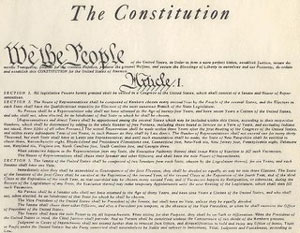
Real Gift Of The Season
December 23, 2010
Violence As American As Apple Pie
January 13, 2011By Janice S. Ellis, Ph.D., Kansas City, MO –
America, with all of its current challenges, is still the best country in the world. If we, individually and collectively, do not cherish it, do not do what is in our power to protect it and the principles it was built upon, then who will?
It really is not about the foreign mad men plotting the next act of terror against America that is the greatest threat to our long-term security. It is not North Korea, Iran, China, or some other nation that is building or stockpiling nuclear arsenals that will bring about our ultimate demise. Rather, the greatest threats to a safe, free, and healthy America are of our own making. We have seen the signs for some time now.
 Have you revisited the Constitution lately?As we begin this second decade, we must look long-term and beyond our personal preoccupations. We really should revisit the principles and privileges outlined in the Declaration of Independence and recommit ourselves to practice their fullest meaning in our daily lives. We really should know what our Constitution says about how our government should work and help our elected officials in Washington pass policies and enact legislation that will keep our country strong instead of being in the sideline chorus of complainers.
Have you revisited the Constitution lately?As we begin this second decade, we must look long-term and beyond our personal preoccupations. We really should revisit the principles and privileges outlined in the Declaration of Independence and recommit ourselves to practice their fullest meaning in our daily lives. We really should know what our Constitution says about how our government should work and help our elected officials in Washington pass policies and enact legislation that will keep our country strong instead of being in the sideline chorus of complainers.
As a new Congress convenes, and new legislatures open their sessions in state houses across the country, it is a prime opportunity for each of us to take inventory of the political direction of our country, our state, our community. Are we making progress ideologically or have we abandoned our ideals? Are we moving forward, standing still, or loosing ground?
We need to not only ask some questions, but indeed answer them: Is America an environment of equal opportunity for all? Are all of its citizens afforded dignity, respect, equal access, and equal treatment under all of the laws of the land? Is there evidence in your community that the American dream is alive and well? If not, why not? And more importantly, what can be done to change it?
It is true that if you do not understand where you have been, then you do not have clear direction about where you are going. The same is true with the history of America.
With all the technology and information at our fingertips, many of us have gotten away from a practice that strengthened and sustained us when we did not have all the instant communication: Having conversations around the dinner table with family and friends, discussing those issues that affected our lives and that of our neighbors.

We are empowered through out Bill of Rights.
We need to get back to it — pause from work and gather with family and friends, discuss those challenges that America faces, we face. Perhaps, such conversations could stimulate and inspire us to revisit the true meaning of the Bill of Rights, the Constitution, and all of the amendments in between. Let meaningful dialogue punctuate — it doesn’t need to replace, but rather just be a part of — the constant information feed that usually competes for center stage. We are bombarded constantly with information, and then commentary, often distorted or slanted to promulgate someone’s personal agenda.
Amid it all, we must find time to ponder what it means to be an American, an African-American, an Hispanic American, an Asian American — whatever your racial and ethnic origin. You might examine whether you, as an individual, as a member of this melting pot, are truly giving and living, ensuring and enjoying, providing and partaking of all the opportunities this rich land affords.
More importantly, what are you doing to ensure that all of these privileges and opportunities are protected for our children and future generations? What is your role in it all? We often feel that we cannot do anything or if we do, it won’t make a difference anyway — an attitude we must change. Whatever gains have been made at the national, state or local level have often been as a result of many people being willing and courageous enough to speak out, and get involved, when it counted.

The American Flag, a constant unifying symbol that we are one country, regardless of our racial or ethnic origins.
Imagine where America would be, or would there be an America, had George Washington, Thomas Jefferson, John Adams, and Thomas Payne, decided not to speak out and take actions against religious persecution, or taxation without representation? Imagine where African-Americans would be in this country had it not been for Frederick Douglas, Harriet Tubman, Thurgood Marshall, Martin Luther King, Jr., and countless others who spoke out and risked their lives in order that the disenfranchised could have the right to vote, have access to schools, public accommodations, and jobs.
As we begin this New Year, this new decade, let us individually and collectively rededicate ourselves to the great ideals and values upon which this nation was founded. There are important social, economic, and political issues all around that will affect us, our children, and our children’s children.
Resolve to get involved to protect and keep America strong. Resolve to be a better American
Edited and Reprinted with Permission of USAonRace.com

